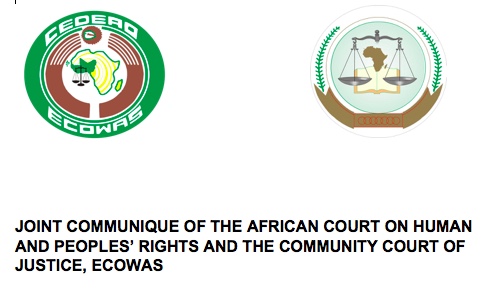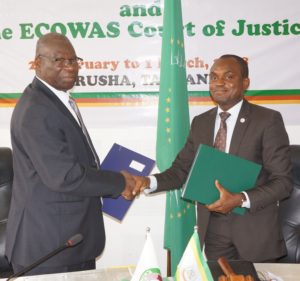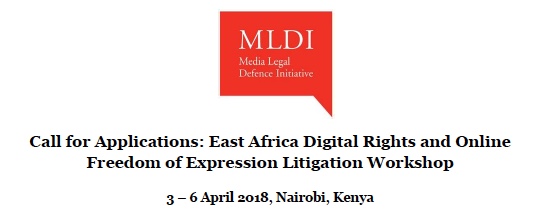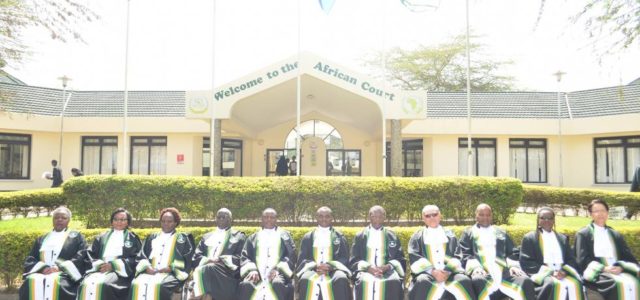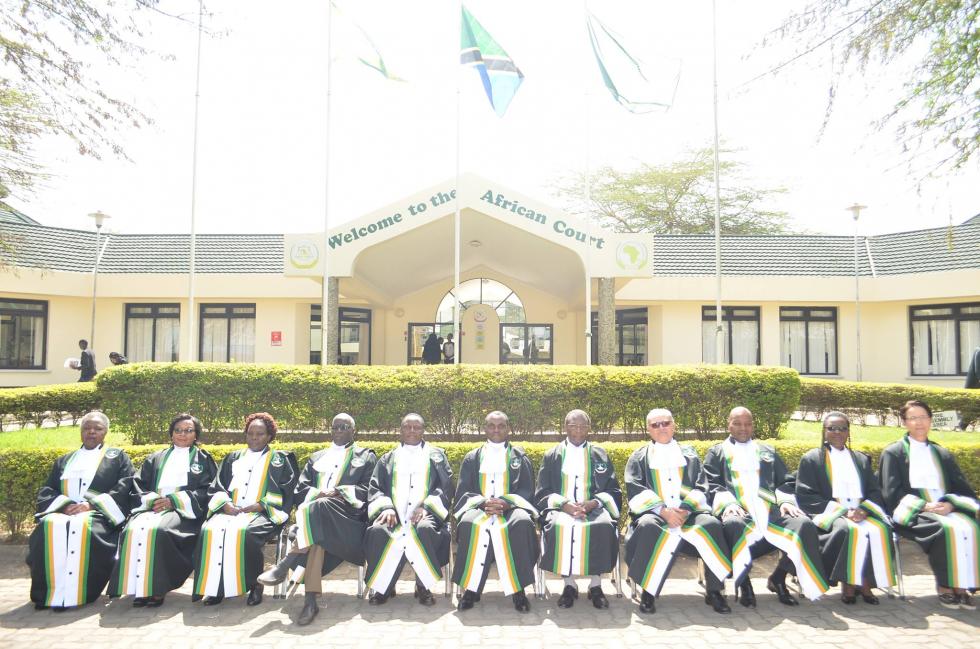Hopefully readers of this post will have seen the first part of my analysis of the Ingabire v. Rwanda judgement. If not, or if you want to reminder, you can find it here. In this second part, I am going to review the African Court’s findings on the right to freedom of expression and opinion (Article 9(2) of the African Charter and Article 19 of the ICCPR) and finish with some analysis and conclusions.
Freedom of Expression and Opinion
The Arguments
Let’s first look at the arguments of Ingabire, Rwanda and the Rwandan organization the National Commission for the Fight against Genocide who submitted an amicus brief in this case.
Ingabire argued that she was convicted for the minimisation of genocide, whereas the opinion she expressed during a speech at the Kigali Genocide Memorial concerned the management of power, the sharing of resources, the administration of justice, the history of the country and the attack that led to the demise of the former President of Rwanda. Ingabire contended that she had no intention to minimise and trivialise genocide or to practice the ideology of genocide. Rather, she argued that the right to express her opinion was protected by the Constitution of Rwanda and other international instruments. Ingabire submitted that the Rwandan laws surrounding the genocide were vaguely drafted, and could be used to restrict legitimate discourse rather than the legitimate aim of preventing anti-genocide rhetoric.
Rwanda submitted that the right to express one’s opinion is subject to limitations. Considering the social context, the history of and environment in Rwanda, it argued that there was reason to enact laws to penalise the minimisation of genocide, something countries around the world have also done.
The National Commission for the Fight against Genocide, argued that Ingabire’s words amounted to support of the “double genocide” theory. It explained that the theory of double genocide is intended to transform the 1994 genocide against Tutsis in Rwanda into an inter-ethnic massacre, and at the same time, exonerate the perpetrators, their accomplices and their sympathisers. Put simply, this theory considers that there were two genocides in Rwanda, and that the Tutsis are therefore as guilty as their executioners.
The Law
With these arguments in mind, its worth revisiting the wording of Article 9(2) of the African Charter and Article 19 of the ICCPR under which Ingabire brought her claim. Article 9(2) of the African Charter states:
Every individual shall have the right to express and disseminate his opinions within the law
Article 19 of the ICCPR states:
- Everyone shall have the right to hold opinions without interference.
- Everyone shall have the right to freedom of expression; this right shall include freedom to seek, receive and impart information and ideas of all kinds, regardless of frontiers, either orally, in writing or in print, in the form of art, or through any other media of his choice.
- The exercise of the rights provided for in paragraph 2 of this article carries with it special duties and responsibilities. It may therefore be subject to certain restrictions, but these shall only be such as are provided by law and are necessary: (a) For respect of the rights or reputations of others; (b) For the protection of national security or of public order (ordre public), or of public health or morals.
The African Court’s Findings
Bearing these words in mind, the African Court stated that the right to freedom of expression is one of the fundamental rights protected by international human rights law. It found that as such, respect for this right is crucial and indispensable for the free development of the human person and to create a democratic society. The African Court made clear that this right comprises, amongst others, the freedom to express and communicate or disseminate information, ideas or opinions of any nature in any form and using any means, whether at national or international level. It also requires Member States to protect this right from interferences regardless of whether the interferences originate from private individuals or government agents.
However, as is plain from the wording of the African Charter and ICCPR, this right is not to be enjoyed without limits. Referring to the Konate v Burkina Faso case, the African Court recalled that freedom of expression is not an absolute right and under some circumstances, it may be subject to some restrictions. ln particular, in Konate, relying on Article 19 (3) of ICCPR and the jurisprudence of the African Commission on Human and Peoples’ Rights, and other international and regional human rights bodies, the African Court held that the term ‘within the law’ in Article 9(2) of the African Charter envisage the possibility where restrictions may be put in place on the exercise of freedom of expression, provided that such restrictions are prescribed by law, serve a legitimate purpose and are necessary and proportional as may be expected in a democratic society.
Considering this, the African Court made it clear that there was no question that Ingabire’s convictions represented a restriction of freedom of expression. The question the African Court then needed to consider was whether this restriction was: (i) provided by law; (ii) served a legitimate purpose; and (iii) was necessary and proportional in the circumstances of the case, thus satisfying the limitations found within the African Charter and ICCPR on freedom of expression.
(i) Provided by Law
The African Court made clear that the reference to the “law” in Article 9(2) of the African Charter must be interpreted in the light of international human rights standards which require that domestic laws on which restrictions to rights and freedoms are must be sufficiently clear, foreseeable and compatible with the purpose of the African Charter and international human rights conventions and has to be of general application. Considering then Ingabire’s claims that Rwandan laws on the minimisation of the genocide are vague and unclear, the African Court found that some of the laws are “couched in broad and general terms” and “may be subject to various interpretations”. However, the African Court found that these types of crimes are “difficult to specify with precision”. Combining this with the margin of appreciation that Rwanda enjoys in defining and prohibiting some criminal acts in its domestic legislation, the African Court was of the view that the laws provide adequate notice for individuals to foresee and adapt their behaviour to the rules still specific enough to comply with Art 9(2) of the African Charter.
(ii) Served a Legitimate Purpose
As to the “legitimate “purpose” element, the African Court found that the purpose of the laws themselves- to prevent the minimisation of the genocide in Rwanda- served the legitimate interests of protecting national security and public order, and therefore the restriction was merited.
(iii) Necessary and Proportional
With regards to the “necessary and proportional” element, the African Court made clear that what was required was that the restriction “was strictly necessary in a democratic society and proportional to the legitimate purposes pursued by imposing such restrictions”. The African Court found that when considering the necessary and proportional nature, some speech, such as political speech, in particular, when they are directed towards the government and government officials, or are spoken by persons of special status, such as public figures, deserve a higher degree of tolerance than others.
Importantly, the African Court further stated that freedom of expression also must include not only “information” or “opinions that are favourably received or regarded as inoffensive, but also those that offend, shock or disturb” a State or any section of the Population. In assessing the restriction, the African Court stated that this could not be done in a vacuum and due consideration should be given to particular contexts in which the impugned expressions were made.
The African Court considered, in this particular case the context and background was the 1994 Rwandan genocide, described by the African Court as the “most atrocious genocide in the recent history of mankind”. The African Court therefore found it entirely legitimate for Rwanda to adopt laws concerning the minimisation propagation or negation of the genocide. However these laws cannot be adopted at all cost to freedom of expression and international human rights law. However, these laws could not be applied at any cost to the rights and freedoms of individuals or in a manner which disregards international human rights standards. The legitimate exercise of rights and freedoms by individuals is as important as the existence and proper application of such laws and is of paramount significance to achieve the purposes of maintaining national security and public order. ln all circumstances, it is important that restrictions made on the fundamental rights and freedoms of citizens are warranted by the particular contexts of each case and the nature of the acts that are alleged to have necessitated such restrictions.
In assessing Ingabire’s words, the African Court split them into two categories: (i) concerning the genocide; and (ii) with regard to comments on the Rwandan government, including the President, and judiciary. Concerning the comments on the Rwandan genocide, the Court noted there were three versions of the speech made by the Applicant. The Applicants’ own, the version considered by the Rwanda High Court and the version considered by the Rwandan Supreme Court.
Since the issue is fairly nuanced, it seems prudent to repeat the versions here. Ingabire alleged she said:
“…if we look at this memorial, it only refers to the people who died during the genocide against the Tutsis. There is another untold story with regard to the crimes against humanity committed against the Hutus. The Hutus who lost their loved ones are also suffering; they think about the loved ones who perished and are wondering “When will our dead ones also be remembered?”
The Kigali High Court version is as follows:
“…For example, we are honouring at this Memorial the Tutsis victims of Genocide, there are also Hutus who were victims of crimes against humanity and war crimes, not remembered or honoured here. Hutus are also suffering. They are wondering when their time will come to remember their people ( …)”
Finally, the Rwandan Supreme Court version reads:
“…For instance, this memory has been dedicated to people who were killed during the genocide against the Tutsi, however there is another side of genocide: the one committed against the Hutu. They have also suffered they lost their relatives and they are also asking, “When is our time?” (…)”
Whilst all three versions may appear similar there are some crucial differences. The African Court noted that the Supreme Court version mentioned “another side of genocide: the one committed against the Hutu” which seems to imply the theory of “double genocide” which is illegal under Rwandan law as part of the offence of “negation of genocide”. The High Court version and the applicant’s own meanwhile, refer to the Hutus begin victims of crimes against humanity and war crimes”- two distinct and separate crimes to genocide under international criminal law. The African Court found that where there were three competing versions benefit should go to Ingabire, noting that Rwanda did not formally oppose Ingabire’s version in its response.
Turning then to consider the version submitted by Ingabire, the African Court acknowledged that, as in any country where there is a history of genocide, the issue is very sensitive, and opinions or comments made in relation to the genocide may not be treated in a similar manner as opinions expressed on other matters. The African Court considered that statements that deny or minimize the magnitude or effects of the genocide or that unequivocally insinuate the same fall outside the domain of the legitimate exercise of the right to freedom of expression and should be prohibited by law. In Ingabire’s case however, the African Court found that there was nothing in her statements, which denied or belittled the genocide committed against the Tutsi or propagated the theory of “double genocide”. Whilst the African Court again acknowledged that words said it certain contexts can meet different things, it nevertheless found that putting criminal punishment restrictions on the rights of individuals merely on the basis of contexts would create an atmosphere in which citizens cannot enjoy basic rights including freedom of expression.
As to the second category of comments made of the government and the Rwandan President, the African Court found that some of Ingabire’s comments made may well have been found offensive and could have the potential to discredit the integrity of public officials and institutions. However, these were the very kind of comments expected in democracies, and should be tolerated especially from public figures. The African Court therefore found that Ingabire’s convictions for “inciting strife”, creating “divisions amongst people” or “threatening the security of the state” were not proportionate, and in any event there was no evidence that these comments had resulted in anything simiar to this happening.
The Court therefore found the applicant’s prosecution and conviction was not necessary. The Court finally noted that even it the Court were to accept that such statements needed to be limited, the punishment was still disproportionates to the legitimate need to limit such statements, finding that Rwanda could have adopted less restrictive measure to attain the same objectives.- Violation of Art 9(2) of the Charter and Art 19 of the ICCPR.
Conclusion
Firstly, the judgement brings little in the way of new developments on either admissibility or jurisdiction, as I alluded to in part one of this post. For jurisdiction, Rwanda argued the familiar line that the African Court cannot be used as an appeals court for criminal convictions. This line of argument though, misses the point. The African Court itself agrees that it cannot act an appeal court. What the African Court does is to consider convictions against the rights found in the African Charter and other international human rights instruments a Member State has signed up to. The African Court is not asking “can we overturn this conviction?” but rather “does the conviction comply with human rights standards?” This may not be the last time we see a member state argue this line, but there now exists a solid body of jurisprudence that easily rebuts it that hopefully Member States take note of.
Similarly, in terms of admissibility, Rwanda continued the tradition of member states arguing that the applicant had failed to exhaust local remedies. The exhaustion of local remedies requirement is extremely important; the African Court is a court of last resort and, generally speaking, applicants must demonstrate they have taken their case as far as possible domestically before availing itself of the African Court. However, such a requirement cannot be never-ending. Rwanda pointed to the possibility of constitutional review and further reviews of convictions as avenues not yet explored by Ingabire. In fact, in this case Ingabire had pursued a conditional review, but this is not generally required. Applicants must show they have exhausted local remedies but to do this should not be overly burdensome or onerous; typical avenues must be taken, petitions filed, and appeals lodged but not every possible arcane or technical avenue must be explored; to do so leave the bar too high for applicants to access the institution.
Turning now to the merits, this judgement makes important strides on the right to fair trial and the right to freedom of expression. On fair trial, the African Court examined closely Ingabire multiple claims. It is important to note that not all elements were successful. For presumption of innocence and the right to be tried by a neutral and impartial court for example, the African Court was not persuaded by the evidence, demonstrating that to prove these foundational issues is a high bar indeed. Greater success was found in more readily demonstrable actions by the Rwandan courts; barring defence counsel from cross examining witnesses and threats and intimidation of defence witnesses. Here, the African Court was able to consider specific allegations, rather than the more catch-all “its all biased” claims and find that these kinds of actions were indeed violations of Article 7 of the African Charter.
The African Court also engaged in a very interesting examination on the principle of legality of crimes and penalties, and non-retroactivity of criminal law. Taking Article 7(2) of the African Charter as its foundation (“No one may be condemned for an act or omission which did not constitute a legally punishable offence at the time it was committed. No penalty may be inflicted for an offence for which no provision was made at the time it was committed…”) the African Court made clear that criminal responsibility and punishment must be based only on the prior promulgation of laws which prohibit a particular conduct. These laws must also be easy to find or be aware of. In other words, the African Charter (as other international human rights instruments do) ensures that a person can only be convicted of a crime when it is crime before the actions take place and the existence of it as a crime is easily available. This precludes arrests and convictions without legal basis (“no law”) or arrests and convictions on hard to find or obscure laws (“secret laws”).
Similarly, the African Court made clear that non-retroactivity has no place within international human rights law, that is to say the imposition of criminal sanctions on events that took place before the sanctions come into existence, unless the new sanctions are favourable to the accused. However it should be noted that this exception is exactly what the African Court considered happened in this case. Under the “old” laws Ingabire was facing possible prison sentences of life imprisonment and 10-20 years. Under the “new” laws which came into being after the initial convictions, Ingabire faced 20-25 and five-nine years imprisonment respectively. The “new” laws carried shorter sentences and therefore could be considered more favourable, and thus fell into the exemption to non-retroactivity. Of course this was complicated somewhat by Ingabire actually receiving a longer sentence under the “new” laws than the “old”. However, the African Court considered this not to be as a result of the laws themselves but for the rejection of mitigating circumstances and conviction on appeal of charges Ingabire was acquitted of at trial. Of course this begs the question, if the “new” laws were not in place, would Ingabire have been sentenced to? Was Ingabire really enjoying the benefit of the new more lenient laws when their existence allowed for a longer sentence to be imposed?
As to freedom of Expression, the African Court made clear pronouncements that build on the previous Konate case. Of particular note is the African Court’s clear statement that Article 9 of the African Charter protects speech that may be offensive or decidedly uncomfortable to those in power. This notion may be familiar to readers (“I disapprove of what you say, but I will defend to the death your right to say it” to quote Evelyn Beatrice Hall ) but I think its important that the African Court is laying it down once again in its own judgements and aligning it directly with the African Charter. Indeed, the African Court made clear that Ingabire’s comments concerning Rwandan leadership may well have been offensive, but that this is precisely the kind of comments that those in public positions must be willing to deal with. This is the “thick skin” line of argument- if you are in the public sphere then you must be willing to bear criticism which goes as far as to offend. Of course, freedom of expression is a balancing act. It does not possess carte blanche status, and Article 9 (2) recognises that some comments and expressions should be curbed. It is a balancing act: weighing cultural, historical and contextual factors alongside a myriad of other considerations. But again, the African Court made clear that this was entirely appropriate. What the African Court found inappropriate is using laws to quash comments or speech which are uncomfortable to either society or especially a countries’ leaders.
So with this latest judgement, the African Court adds another layer to its incremental journey towards shaping the right to fair trial and the right to freedom of expression across Africa. Lets hope Member States are following this closely and are willing to proactively revisit their procedures and laws to adhere to this changing landscape.

www.acthprmonitor.org
@acthpr_monitor


